Mon, Jun 26th 2023
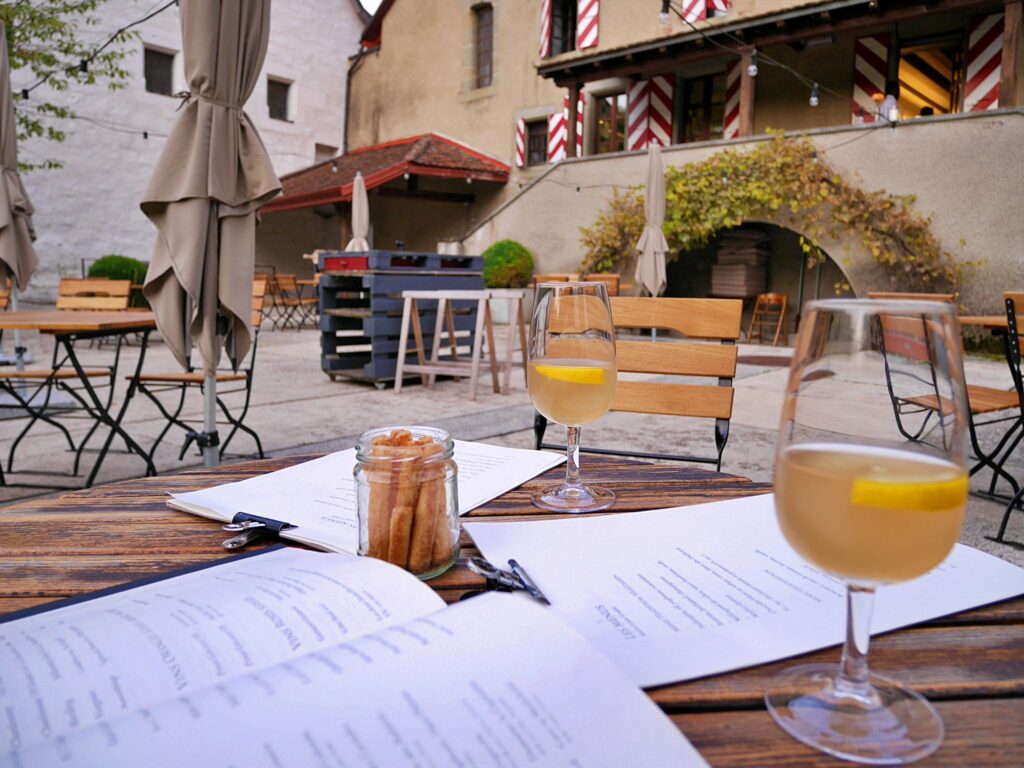
Food waste in Switzerland is a big issue, and the government recently passed a new goal to limit food waste even more by 2025. It is estimated that 2.6 million tonnes of food are wasted* and the country’s food industry has a significant role in this problem’s solution.
The renowned Michelin guide recently introduced its “green star,” awarded to environmentally-conscious restaurants. This will motivate those involved in the fine-dining scene to take food waste and sustainability more seriously. Consumers have a significant role to play as well, both in their kitchens and also when selecting to dine out. Dining in a restaurant which sources most of the food it serves locally and following sustainable practices is nowadays considered a political act.
The Auberge de l’Abbaye de Montheron in Vaud was given a Green Star by the Michelin Guide in 2021, as a recognition of its sustainable practices. We speak with the restaurant’s Chef Rafael Rodriguez and co-owner Romano Hasenauer about how they succeed in offering a memorable gastronomic experience while following sustainability practices and honoring the local produce.
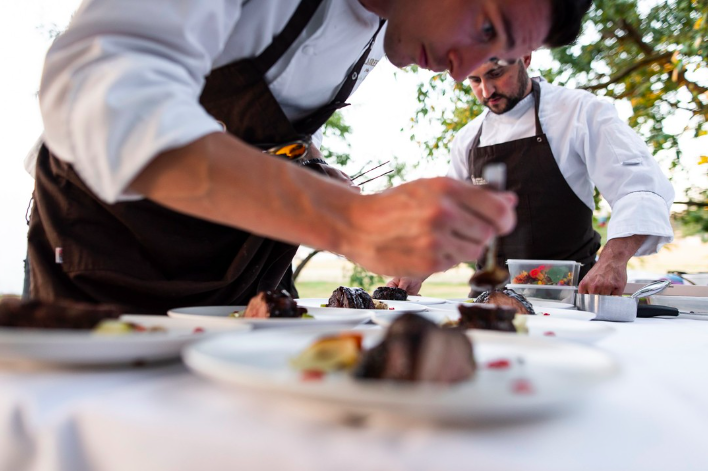
Chef Rafael Rodriguez, born in Astrurias and raised in Almeria, Spain, was influenced by the philosophy of Feran Adria.
“He created a revolution in the hospitality industry, and many people my age became chefs because of him. He changed the mentality of the entire country,” he said.
However, a few years back becoming a chef was not glamorous. His mother didn’t approve of his decision, but he did it anyway. When he was 19 years old, he left Almeria to travel, study and work in Barcelona, Girona, and Naples. Then, he landed in Switzerland.
From his work experience at the legendary El Celler de Can Rocahe got clear on his values: being honest, humble, respectful. While working there, he loved that the Roca family made everyone feel part of the family.
“We became true friends, and they have visited me here in the restaurant.,” he said, adding that “despite their huge success, they keep living in the same way, in the same area. This is very honest and I respect them deeply. That’s what I want to transfer to people who come to work here with us. Awards are important, but there are other things more important.”
Chef Rodriguez joined the Auberge de Montheron team in 2014; the other two associates are director David Donneaud and co-owner Romano Hasenauer. Auberge de Montheron has always been a “bistrot de campagne,” and the three associates lead a team of 12 people.
“Our purpose is to do our work well. Today better then yesterday, and tomorrow better than today. We don’t look for recognition or for awards,” Chef Rodriguez says.
Respect for the products is the core of Chef Rodriguez’s philosophy. He sources good quality products and serves them as natural as possible. What he loves most about his job is the challenge, the fact that every day is different.
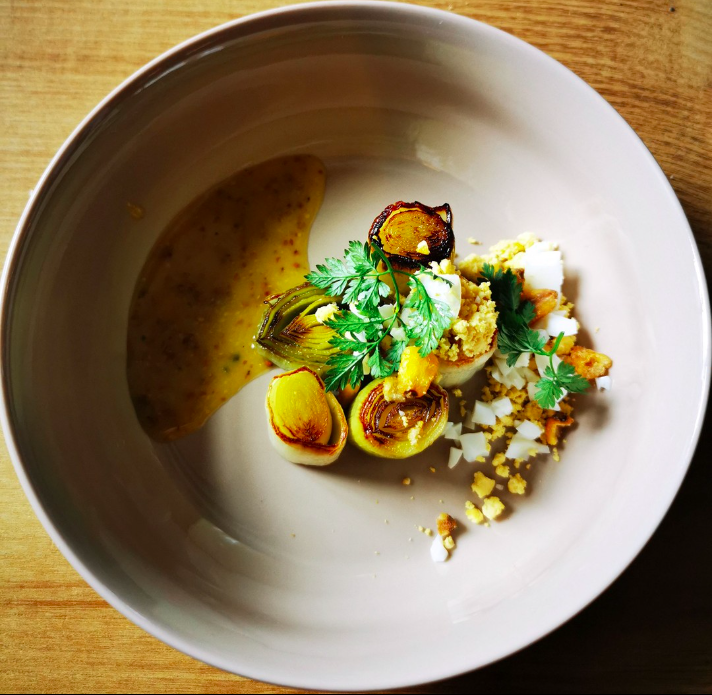
At Auberge de Montheron, they work primarily with products that come around the restaurant and thus, the team is limited. This can be challenging, but it’s also very simple.
“My favorite season is winter because we have even less products to work with,” chef Rodriguez says.
A few items on the menu change on a weekly basis depending on the availability of the produce, that’s why they print the menu on paper. They currently offer two menus, “tradition” and “discovery,” and there are always alternative options for vegetarians.
Some of the local producers they work with are: Ferme Hess for vegetables (Mont-sur-Lausanne), Famille Henny for fruits (Mont-sur-Lausanne), Le Gibier du Domaine for meat (Thierrens), Moulin Chevalier for flour (Cuarnens), and Laiterie du Haut Jorat for butter (Peney).
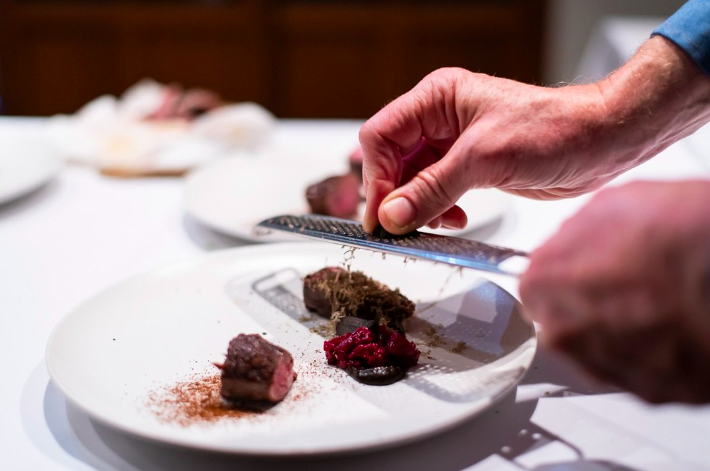
They received the news of their Michelin Green star award in February 2021, when they were still closed.
“We don’t know details of their decision, but we were happy to be included in the guide, especially since we were the only restaurant in Suisse Romande,” Rodriguez says. In the chef’s opinion, this new category is a great new addition which also shows that the guide re-invents itself and follows the society’s evolution.
The Michelin Green Star award was awarded to them rightfully.
The restaurant’s main philosophy revolves around sustainability as they use mainly products that are produced nearby to avoid transportation. For meat, they buy entire animals and use all the parts from farmers or hunters with whom they develop friendly connections.
“There are hundreds of restaurants in Lausanne, but they decide to sell to us and this is very important to us; it’s a luxury,” Rodriguez points out. Food waste is taken seriously here: they calculate their needs well and use every product they have. They use their leftovers for compost or to feed their chickens and cooked leftovers are taken over by the city of Lausanne to use as biogaz.
“For the future we are looking to remove packaging entirely,” Mr. Hasenauer adds.
In 2022, the team took a risk and stopped using chocolate and exotic spices in their kitchen.
“Chocolate might be well known in Switzerland, but it comes from afar,” chef Rodriguez says. At Auberge de Montheron, they are not only concerned about the durability of the products they use; they also try to minimize the electricity consumption by using less lighting in the evenings while the waiters’ clothes are made of recycled material.
What’s more important though is that they prioritize the wellbeing of the people who work at the restaurant. In 2022 they decided to close on Sundays, even though this was a very popular day revenue-wise.
“For us it’s important for our personnel to be able to spend Sunday with their families. The wellbeing of our personnel and ourselves is a priority; business comes afterwards,” the chef says.
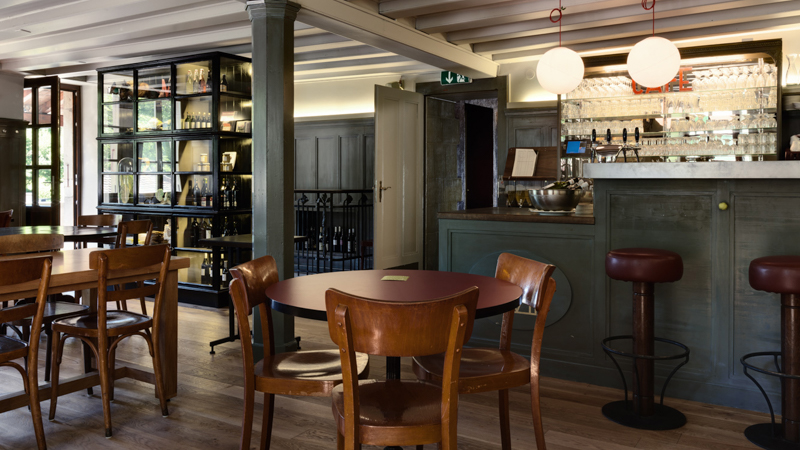
The interior at Auberge is beautifully simple, almost monastic. David Donneaud orchestrates the service, providing a serene atmosphere where clients can truly enjoy their dining experience. Primary goal for the team is for their clients to appreciate the producers’
work through tasting their menu.
For Chef Rodriguez, dining is about having a good time with friends; the food is just an excuse.
“Some people say that we, the restaurateurs, are artists. I don’t believe that. We are just an excuse for the people to get together and have a nice evening,” Rodriguez says, adding “in the end of it all, what’s important is to be happy” with or without awards.
This article may be freely shared and re-printed, provided that it prominently links back to the original article.
